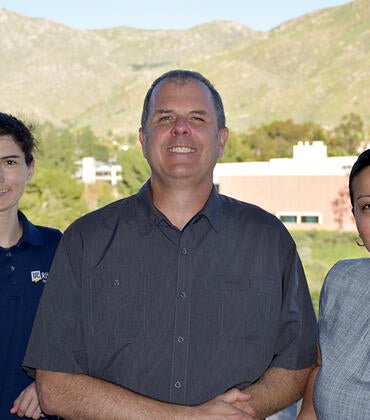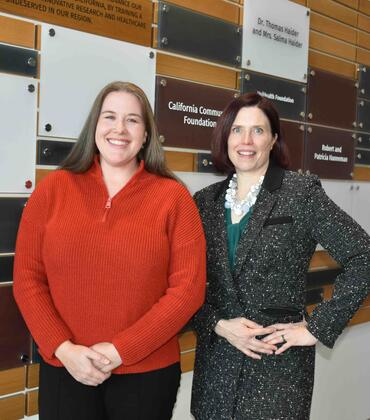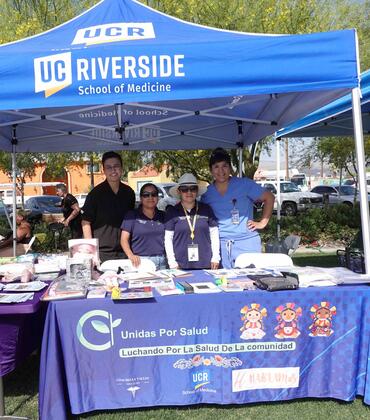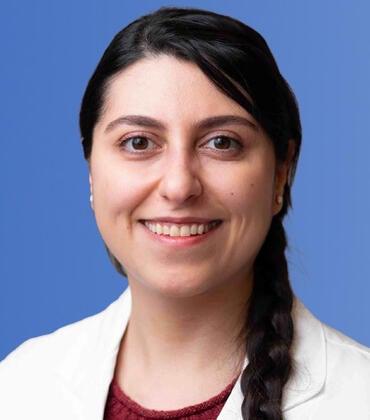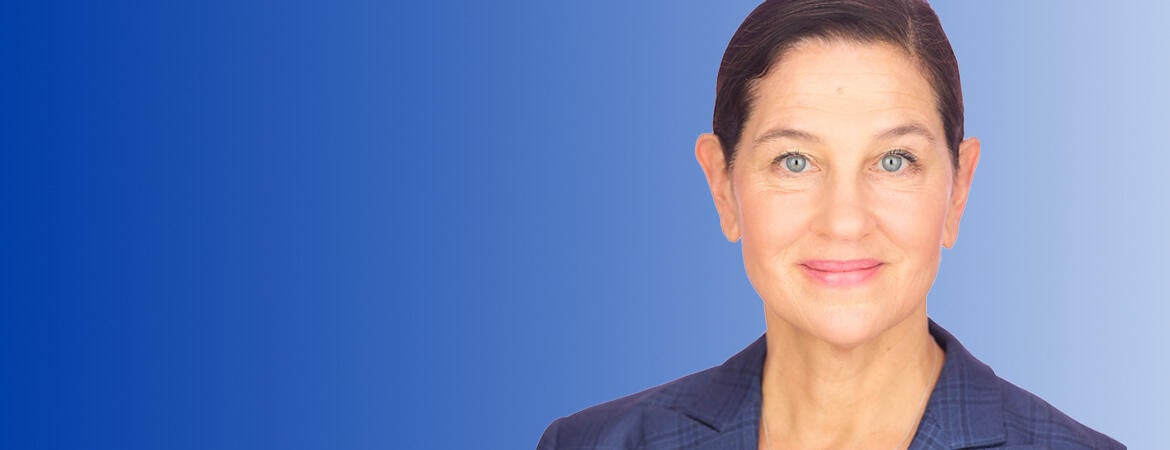
As a child growing up in a conservative part of Southern California, Elizabeth A. Jacobs, MD, MPP, frequently heard her neighbors disparaging the migrant farmworkers who lived in the area. Jacobs’ mother taught many of the farmworkers’ children in a nearby high school, leading to Jacobs becoming friends with some of them.
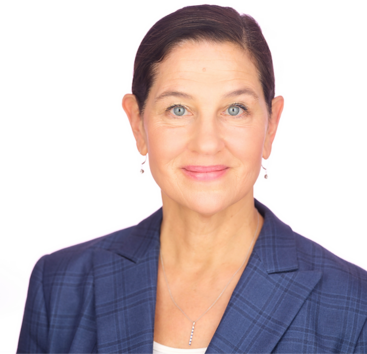
“They were incredible people, but people in my community did not speak of them in that way,” Jacobs recalled. “It's like what's happening right now–immigrants are vilified in ways that aren't true or fair.” The observation sparked her interest in diversity, equity, and inclusion (DEI), including helping others value all human beings, and set her on the path to becoming a doctor.
At first, Jacobs planned to work toward improving health at a global level. Taking a year off from medical school at UC San Francisco, she completed international rotations in places like Africa, where she observed babies dying from neonatal tetanus and other preventable diseases. Yet when she returned home to the United States, she was surprised to experience reverse culture shock. “We have places in our country that still look like third-world countries when you look at disparities they experience, or lack of resources, lack of good housing, and clean water, so I realized that I should really focus my career here in the United States,” she said. “It was kind of an awakening for me, thinking, there’s so much we have to do here, why would I think about leaving?”
Jacobs focused on advancing health equity and reducing health disparities during her career at schools including the University of Texas at Austin’s Dell Medical School and the University of Wisconsin School of Medicine and Public Health, creating clinical and educational programs that aimed at increasing equity and inclusivity. In 2024, she happened to hear Deborah Deas, MD, MPH, the vice chancellor for health sciences and the Mark and Pam Rubin dean of the UCR School of Medicine, speak at an Association of American Medical Colleges (AAMC) meeting about the SOM and its mission to improve the health of underserved people in the Inland Empire.
Jacobs immediately felt inspired by the SOM’s mission. “I loved how much it aligned with my personal mission as a professional and a human being,” she recalled. In August 2024, she became chair of the Department of Internal Medicine at UCR.
Focusing on DEI at UCR
One of Jacobs’ main goals in her new role involves attracting students and faculty to the SOM–particularly ones who represent, and are dedicated to, its mission. “I think it's really important that we think about who are the communities that we serve, and whether our community of residents and fellows or medical students that we're training reflect that community,” she said.
Jacobs plans to achieve this objective in part by focusing on fostering an inclusive environment at the school. Her experiences throughout her career have highlighted the importance of inclusivity for all. She shared an example from her time at one primary care clinic where a patient treated their physician disrespectfully because of the physician’s identity. “This is a really important principle that if you're going to create an inclusive environment, it has to be inclusive for everyone,” Jacobs said. “I pay attention to, what are our policies, are those policies creating equity and inclusivity for everyone, and does everyone feel that they can come into the environment and do their job to the best of their abilities, or to get care in a way that they will feel safe?”
Jacobs also looks forward to serving as a mentor and role model for medical students and fellows at UCR, paying forward the support she received from her own mentors in medical school. “I was really inspired…by amazing mentors and role models at UCSF,” she said. “I hope I can be someone who can be that kind of role model as well.”
She has already begun connecting with SOM students, including first-year student Sanya Dhama. “As a first generation medical student interested in serving my community through both care in the clinic and public policy, Dr. Jacobs has been a great mentor to me,” said Dhama. The two have covered topics from medical advocacy to government interference in evidence-based medicine, discussions that Dhama said have helped guide her and her peers toward seeking change. “I leave every conversation with a new seed of inspiration,” Dhama added. “She is also very supportive, connecting me to potential partners in projects to push forth UCR SOM and UCR Health’s missions.”
For Jacobs, effective mentorship also includes providing resources students need to be successful. “People often think about, ‘how do we bring people into medical school,’ maybe not recognizing that when they come from a different background, certain things in that environment are going to be very new for them, and they may not know how to approach them because they didn't have parents or others in their community that went through it,” Jacobs said, using familiarity with standardized testing as an example. “Those things tend to be more challenging if you haven't had as many experiences with it, so the idea is to create opportunities and support in settings where people may not have the same experience as others.”
As she works more with residents and faculty, Jacobs said she’s open to adjusting her goals. “I'll gain more firsthand experience with some things that we can do to improve, if needed, the educational environment or the clinic environment for patients, residents, and faculty,” Jacobs said.
Improving healthcare for patients
Just as she plans to directly assess the SOM’s needs through talking with students and faculty, Jacobs, who will soon begin seeing patients at UCR Health, said she looks forward to learning more about community issues from patients themselves. “I always find that patients really help me understand the needs of the community,” she said. “That's what I love about working with patients.”
One area Jacobs already plans to address involves improving accessibility for patients, such as through increased interpreter and translation services. Her previous research highlighted the importance of this area. “A lot of work that I have done is looking at language barriers to access to medical care, and we know that when you provide adequate linguistic services, mostly interpretation, people get better care,” she explained. “It's kind of common sense, but any place I go, I really work hard to advocate for access to those services.”
Promoting equity and increasing access to care is a primary focus of her research in general. The current project she’s working toward aims to help individuals in the community learn about and participate in clinical trials, particularly for regenerative medicine. Historically, Jacobs said, there have been disparities among research participants, both preventing these groups from accessing potential new treatments and making research results less applicable to them. Her research, she added, will contribute to the SOM’s mission by “really thinking about how to help people get access to cutting-edge treatments.”
Upholding the SOM’s mission
While Jacobs is relatively new to the UCR SOM, she’s already dedicated to its mission and to finding new ways to uphold it. “As we train a very diverse group of individuals and create inclusive environments where they can thrive, they're more likely to actually do what we're trying to do with the mission, which is to really stay within our communities and practice there,” she said.
The SOM’s mission is particularly vital, Jacobs said, in the current political climate that is deemphasizing or dismantling DEI initiatives. “There's a huge anti-DEI movement right now–but that's wrong,” she said. “We know from social science that when you bring people in with different perspectives and different ways of approaching problems, they come up with better solutions. They see problems that someone else may not see, and you're more likely to be successful.”
Jacobs has watched anti-DEI initiatives hurt her previous institutions, including the University of Texas at Austin. In addition to reduced diversity in medical school applicants and matriculants, she said, faculty have left the school or been harder to recruit.
“For as long as we can, we need to maintain places and spaces in our country where a focus on equity can exist and thrive,” Jacobs said. “It's good for our community, it's good for California, and it's really good for our nation…and I truly hope that we can maintain that in the face of these political headwinds,” she continued.
“So that's why this mission at the SOM is really important,” Jacobs added. “It makes our community better. It makes our school better. It will make the Inland Empire better.”
